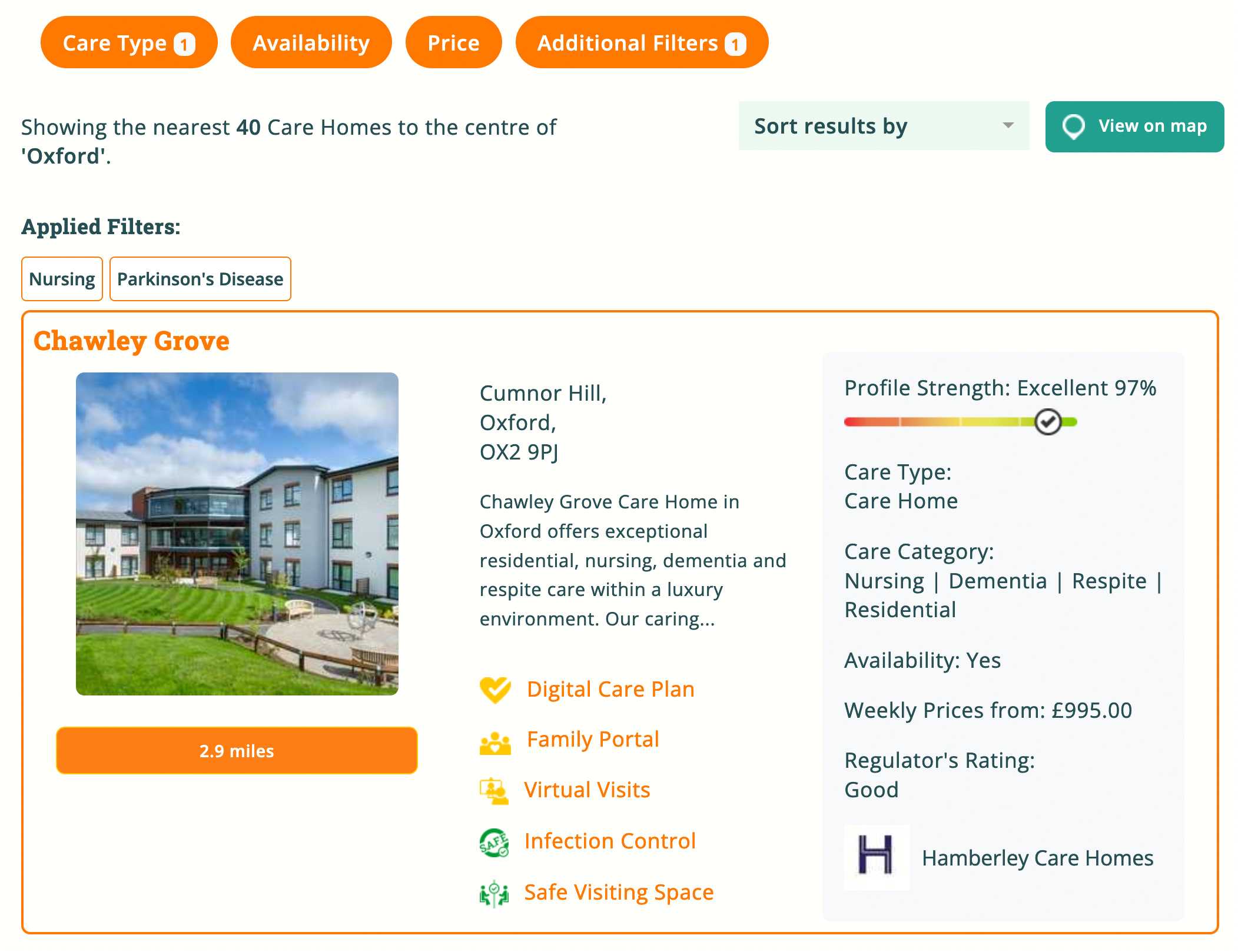Posted by Rachel Bashford
How Is Parkinson’s technology developing?
Technology is quickly advancing to help diagnose, treat and support people with Parkinson's.
This latest blog from Autumna explores the progress being made.
Read on for the latest around:
• How tech could help to diagnose Parkinson’s more quickly.
• New tech to assist people with Parkinson’s.
• Technology helping to create new Parkinson’s medication.
How Can Tech Help With Parkinson’s Diagnosis?
According to Parkinson’s UK, there are around 145,000 people in the UK with Parkinson’s. This approximately represents 1 in every 350 British adults, with 2 people receiving a Parkinson’s diagnosis every hour.
Parkinson’s is a neurological condition that is degenerative in nature with some of its main symptoms being tremors, body rigidity and slower movement. At this present time, there is no cure for the disease.
Existing Parkinson’s Diagnosis Tests
As there is no definitive test for Parkinson’s, it can take some time to achieve a diagnosis as there are other disorders - such as essential tremor – with quite similar symptoms.
At the moment, a diagnosis involves a consultation with a Parkinson’s specialist who will ask in detail about medical history, symptoms and could perform an examination.
There may be other writing, walking or speaking tests so that the specialist can pick up on certain signs that may help them with a diagnosis. In addition, MRI or CT scans can help explore symptoms in more depth.
In this short video from ITV News, Andrew describes being diagnosed with Parkinson’s and how he copes with his symptoms.
Parkinson’s Diagnosis Research Developments
There are a whole host of new research programmes underway the world over to try and find smarter, quicker and more decisive ways to diagnose Parkinson’s.
One such research project is being fronted by the University of Manchester, where scientists are developing a technique to identify the condition through compounds found on the skin.
In May 2021, the university published their research to suggest that Parkinson’s could be identified with a simple skin swab. The test works by analysing skin sebum - the oily substance found naturally on skin - to monitor levels of chemical compounds. This is because people with Parkinson’s can have raised or depleted levels of certain sebum elements.
In truth, this research could be game-changing for the diagnosis and monitoring of the condition. Researchers believe that the skin swab could also be a vital tool in clinical trials to help explore how new treatments reduce, slow or reverse the development of Parkinson’s.
Perdita Barran, Professor of Mass Spectrometry at The University of Manchester explains, “We believe that our results are an extremely encouraging step towards tests that could be used to help diagnose and monitor Parkinson’s.”
Meanwhile, British company Medopad, in collaboration with Chinese firm Tencent Holdings, is working on revolutionary AI research which could potentially diagnose Parkinson’s through a tool with camera functions.
This tool could identify the condition with the camera capturing a patient’s hand movements and assessing signs and symptoms to measure if a person has Parkinson’s and their stage in the condition.
The hope is that, through the use of smartphone technology, a diagnosis could be attained within three minutes, according to the BBC.
To clarify, Dr Wei Fan, head of the Tencent Medical AI lab said, “We use the AI to measure the deterioration of Parkinson's disease, without the patient wearing any sensors or devices.”
Elsewhere at the Royal Melbourne Institute of Technology, research teams are working on a new screening tool that could soon be available to detect Parkinson’s in the early stages.
In more detail, the test includes completing seven writing and drawing tasks on a tablet so that customised software can analyse the results to confirm whether early symptoms exist, when no other obvious signs are pointing to Parkinson’s.
This is important as many treatments and medications are at their most effective if delivered early in the condition, plus the system can also monitor people so that they can better manage their symptoms.
RMIT Professor Dinesh Kumar outlines why giving doctors this tool to screen patients would enable them to receive treatment much earlier than at present.
Kumar comments, “Early detection is critical because we know that by the time someone starts to experience tremors or rigidity, it may already be too late for medication to be effective.”
Kumar continues, “It's long been known that Parkinson's Disease affects muscle control and habitual activities, so it affects how patients write and draw. Our technology translates that insight into a reliable assessment tool.”
This short animation describes the early stages of Parkinson’s and what to look out for in terms of symptoms.
New Technologies To Assist People With Parkinson’s
To help empower and support those living with the condition, the University of Plymouth and University Hospitals Plymouth NHS Trust, have spearheaded a project called Developing Home-based Parkinson’s Care.
This project offers a service including wearable technologies to support those with Parkinson’s at home. Patients wear a device on their wrist called a Personal Kinetigraph that monitors movement symptoms and processes these through an algorithm.
Then, the data enables a specialist team to assess the patient’s symptoms over time with an additional questionnaire investigating patient mood, emotions and their general daily situation.
In fact, this service can work relatively remotely, so that it lessens the burden on hospitals and increases regular contact slots with patients and their families so they feel supported.
Project lead Dr Camille Carroll, Associate Professor in the University of Plymouth’s Institute of Translational and Stratified Medicine, said “The new project is designed to reduce the burden of attending hospital clinics, improve motor and non-motor Parkinson’s symptoms and result in improved quality of life for people with Parkinson’s and their carers. “
People with Parkinson’s describe how valuable existing technology is to their lives and how it helps them manage their condition in this short video.
In another part of the UK, University Hospitals of North Midlands NHS Trust have also launched a wearable technology project to help support people with Parkinson’s.
Patients wear a wrist device to monitor any tremors and other symptoms with the data being analysed by a dedicated team. Information is collected over seven days and used to alter therapies or medications.
This study aims to reduce the burden on Parkinson’s patients who have to manually submit information to their doctors on a regular basis.
Louise Brownsill, Parkinson’s Disease Nurse at the Institute said, “The watches give us a quick, easy and accurate way of monitoring patients remotely making life easier for those living with the condition.”
Ingenuity is advancing technology to help those living with Parkinson’s. A start up called TheMoment, created by an Imperial College student, Lucy Jung, alongside Dr Floyd Pierres from Addenbrooke’s hospital, have innovated the M-co device which is non-invasive and delivers vibrations to the chest.
Vibrations have been proven to help those with Parkinson’s walk and move more easily. Using this information as a basis for the study, the team developed the M-co device so that it employed vibrations to help relieve symptoms and reduce beta wave activity in the brain.
Beta wave activity has often been found in people with Parkinson’s and can be lessened by the vibrational stimulations to improve a wide range of movements. Early testing on the device has recorded a 16% improvement in movement speed in study participants.
How Is Technology Evolving Parkinson’s Medication?
Like any other condition, people who are diagnosed with Parkinson’s may be offered a range of different medications, depending on the stage and severity of their symptoms.
This animation explains the current Parkinson’s medications and how they work to support people living with the condition.
Technology has had an essential role in developing treatments for Parkinson’s, but what is around the corner and coming onstream?
In a recent study completed by Rush University Medical Centre, potential new treatments for Parkinson’s disease have been developed after research showed these slowed the progression of the condition in mice.
A research team at the Rush Centre found that two different chains of amino acids helped slow the spread of alpha-synuclein, a protein that occurs in abnormal protein deposits called Lewy bodies in the brain.
Lewy bodies are hallmarks of Parkinson's disease and as there are no current treatments available that slow the progression of the condition, this could be a major breakthrough.
In another exciting advancement, scientists at The Walter And Eliza Hall Institute (WEHI), have announced the mapping of the entire process that leads to the activation of PINK1, a protein that is directly linked to Parkinson’s.
The team have been able to analyse each stage in PINK1’s development, from initial appearance to how the protein mutates and therefore leads to Parkinson’s. This research could pave the way in generating much more specific medications to slow down the progression of the condition.
What Is The Best Way To Find Support for People Affected by Parkinson’s?
If you or a loved one are affected by Parkinson’s, the search tools on the Autumna site enable you to search for expert Parkinson’s care in your area.

Growing numbers of people are turning to Autumna for support and information on elderly care options. Older people and their families are searching for reliable, independent advice about what to look for and how to secure the best possible future retirement home, home care, live-in care service or care home.
Starting an internet search without really knowing what to look for can be tricky. But, as users quickly discover, the simple search tools on Autumna help people to rapidly find what they are looking for.
Let Autumna help you. Complete this short form to let us know exactly what type of care is important to you, and we’ll send you a free shortlist of providers who can help.
Alternatively email us here: info@autumna.co.uk or call our Advice Line on 01892 335 330. Our phone line is open seven days a week. (8:30am - 5:30pm Mon-Fri, 10am - 5pm Sat, 10am - 4pm Sun).
Other articles to read
Autumna Blog

Older Persons Care Advice
How to revoke a power of attorney
February 21st, 2025
Wondering how to revoke a power of attorney (PoA)? The process depends on the type of PoA. In our blog, we will guide you step-by-step through the process.

Older Persons Care Advice
Senior assisted living made simple
February 19th, 2025
Explore senior assisted living in the UK—find out what it includes, who qualifies, and how to choose the right provider for your care needs.

Older Persons Care Advice
What rights do residents have in a care home?
February 18th, 2025
What rights do residents have in a care home? From dignity and safety to fair contracts, know your legal protections before choosing a care home. Learn more!






